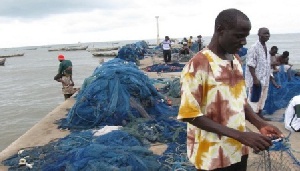Executive Members of the Canoe Fishermen Association at Axim have stated that leaders of the Association across the country were capable of eliminating illegalities practised by fishermen in order to promote the fisheries sector.
They, therefore, urged the government to re-empower Chief Fishermen and their executives to take charge of affairs as it was previously practised, since the present intervention by government was not succeeding.
They made the call when journalists embarked on a field trip to the Axim landing sites, as part of a two-day outreach workshop on the promotion of the fisheries sector.
The workshop which was organized by the Sustainable Fisheries Management Project (SFMP), aimed at finding solution to Ghana’s Fisheries which is near collapse.
It is in an attempt to hype the national call for action towards restoring the fishery for improved food security.
Spokespersons for the Association, Nana Kojo Pegu and Mr Michael Nokoe, noted that previously Chief Fishermen had powers to discipline fishermen who flouted the fisheries laws with impunity.
They regretted that currently things were rather falling apart leading to the low production of fish, attributing this to poor enforcement of the law.
They mentioned some of the bad practices by the fishermen at sea as illegal trade of fish known as “Saiko,” unapproved fishing gears, the use of light and chemicals for fishing, which tend to deplete the stock, as well as the allocation of premix fuel which according them was not transparent.
They decried the practice where politicians often intervened for the release of fishermen and their gear when they were arrested by Naval Personnel.
According to them, during the traditional rule such offenders were arrested and made to appear before the Chief Fishermen for the necessary punishment.
“These days even when Naval Personnel arrest fishermen who use light, dynamite, explosives unapproved gear for fishing, a politician somewhere will plead and the offenders are pardoned”.
For them, these political interference encouraged others to indulge in the illegal fishing business, therefore the time was ripe to reverse situation in order to save the industry from near collapse.
On the issue of “closed season,” the fishermen agreed to stop going fishing during the period, but said the temporary ban must apply to all categories of the fishing sector.
Closed season allows the fishes to replenish to ensure increase in production by the sector.
They mentioned some as Outboard motors, Inshore, Canoes, Artisanal, trawlers and bigger boats.
They said as much as they were in favour of the closed season, they were worried about the next venture to bring income, and appealed for alternative livelihoods during the period, in order to survive.
Touching on the migration of other Ghanaian fishermen who fished close to their territorial waters, they said though it was accepted, such fishermen should announce their presence to the local colleagues for support in the event of challenges.
Mr Kofi Agbogah, National Activities Manager of the SFMP, took the journalists through the onset of the fisheries sector when Chief Fishermen were in control of affairs to the present state which was being handled by government institutions.
He said SFMP which was a consortium of other partners with support of the USAID, was making stringent efforts to save the near collapse of Ghana’s Fisheries Industry.
He urged journalists to contribute to the efforts by writing more on the fisheries sector.
Madam Patricia Aba Mensah, Communications Specialist of the SFMP hinted that drama would be used to educate the fishermen on the adverse effects of bad fishing practices.
Mrs Sarah Agbey, of the SNV, partner of the SFMP, announced award package for people with in-depth articles on the subject matter.
Business News of Tuesday, 27 October 2015
Source: GNA

















